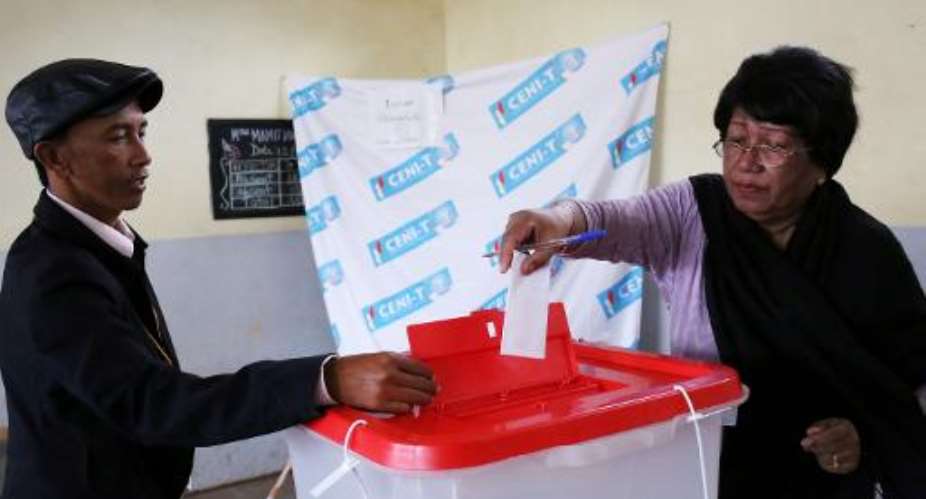Antananarivo (AFP) - Madagascans voted Friday in a presidential run-off aimed at pulling the Indian Ocean island out of the political and economic doldrums and restoring democracy.
Islanders queued to cast ballots from 06:00 am (0300 GMT) in the hope of ending a crisis sparked by a 2009 coup which paralysed much of the government and caused foreign donors to cancel aid.
"I really want to see change in this country. For the past five years it's been truly horrible," said Fanjatiana Ramanantsoa as she stood in line to vote at a primary school in the capital Antananarivo.
Madagascar's main political rivals -- interim leader Andry Rajoelina and the man he ousted, Marc Ravalomanana -- were barred from running amid international pressure over fears of a return to violence.
Instead, vying for victory are the pair's proxy candidates who won the top two places during an inconclusive first round of voting on October 25.
Robinson Jean Louis, 61, a doctor and former health minister, is seen as a slight favourite after winning 21.16 percent in the first round.
He enjoys the support of exiled leader Ravalomanana, who addressed his rallies via phone from South Africa.
His opponent, Hery Rajaonarimampianina, 55, an astute businessman and former finance minister under Rajoelina, won 15.85 percent.
"It is hard to see who will be elected. The Malagasy are divided," said voter Henri Rakotomalala.
Many voters in the capital support Jean Louis and are nostalgic for the Ravalomanana years, from 2002 to 2009, when the country enjoyed relatively strong economic growth.
The milkman-turned-political magnate rose from obscurity to become a powerful businessman and then president.
He was forced from office by Rajoelina, then mayor of Antananarivo, amid violent street protests by Madagascans angry at Ravalomanana's perceived authoritarianism and failure to spread the wealth.
"This is a turning point in Madagascar's history," Jean Louis told AFP, after voting in the capital.
Lagging economic growth
Various observer missions are in the country to monitor the day's voting which will also see lawmakers elected.
"It is a little early to make an overall opinion, but everything is going well for now," said former Mauritius president Cassam Uteem, who heads a team from the Electoral Institute for Sustainable Democracy in Africa.
Campaigning wrapped up on Wednesday with a heated televised debate between Jean Louis and Rajaonarimampianina, after both candidates earlier addressed thousands of supporters at rallies in Antananarivo.
At his rally, Jean Louis vowed to allow his mentor Ravalomanana to return from exile. A few kilometres (miles) away, Rajoelina danced on stage at a rally for his protege Rajaonarimampianina, who pledged to fight poverty.
Nine out of 10 people in Madagascar live on less than $2 a day.
Economic growth reached just 3.1 percent last year, lagging well behind most fast-growing African nations. The World Bank has estimated the country's political crisis has cost Madagascar around $8 billion in lost growth.
More than 7.9 million Madagascans are eligible to vote in the elections, which will also select 151 lawmakers in a single-round parliamentary vote.
Initial results are expected this weekend.
Both candidates have promised a vast infrastructure construction programme for the island, which is roughly the size of Ukraine and has a population of 22 million.
The day has been declared a public holiday. Polls officially close at 5:00 pm (1400 GMT), though stations will stay open for people already in the queue by then.





 There’s nothing you can do for us; just give us electricity to save our collapsi...
There’s nothing you can do for us; just give us electricity to save our collapsi...
 Ghanaian media failing in watchdog duties — Sulemana Braimah
Ghanaian media failing in watchdog duties — Sulemana Braimah
 On any scale, Mahama can't match Bawumia — NPP Youth Organiser
On any scale, Mahama can't match Bawumia — NPP Youth Organiser
 Never tag me as an NPP pastor; I'm 'pained' the 'Akyem Mafia' are still in charg...
Never tag me as an NPP pastor; I'm 'pained' the 'Akyem Mafia' are still in charg...
 Your refusal to dedicate a project to Atta Mills means you never loved him — Kok...
Your refusal to dedicate a project to Atta Mills means you never loved him — Kok...
 2024 elections: I'm competent, not just a dreamer; vote for me — Alan
2024 elections: I'm competent, not just a dreamer; vote for me — Alan
 2024 elections: Forget NPP, NDC; I've the Holy Spirit backing me and nothing wil...
2024 elections: Forget NPP, NDC; I've the Holy Spirit backing me and nothing wil...
 2024 elections: We've no trust in judiciary; we'll ensure ballots are well secur...
2024 elections: We've no trust in judiciary; we'll ensure ballots are well secur...
 Performance tracker: Fire MCEs, DCEs who document Mahama's projects; they're not...
Performance tracker: Fire MCEs, DCEs who document Mahama's projects; they're not...
 Train crash: Railway ministry shares footage of incident
Train crash: Railway ministry shares footage of incident
